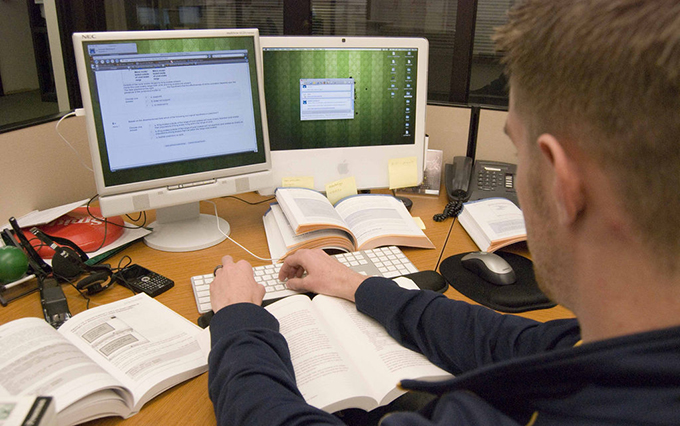This past fall, when colleges within the City University of New York tried to require students to download (and pay for) proctoring apps to prevent them from cheating online, the result was widespread outcry and a petition that garnered 28,000 signatures.
Those objecting to the safeguards cried “Big Brother” and claimed that the measures in effect categorized all students as cheaters.
A just-published study co-authored by Megan Krou, an Analytics & Research Technology Specialist at Teachers College’s Digital Futures Institute, also argues against the use of technology to catch online cheaters in the act — but its rationale has more to do with effective teaching. Krou and her co-authors, Carlton J. Fong, of Texas State University, and Meagan A. Hoff, of Collin College, endorse a proactive approach in which faculty curtail cheating through “the power of motivation.”

PONDERING THE CONUNDRUM Students have cheated for thousands of years. Megan Krou, Analytics & Research Technology Specialist at Teachers College’s Digital Futures Institute, has long been interested in why. (Photo: TC Archives)
In their paper, “Achievement Motivation and Academic Dishonesty: A Meta-Analytic Investigation,” published in Educational Psychology Review, Krou, Fong and Hoff acknowledge that “academic dishonesty is a rampant and troubling phenomenon in the educational sector,” but contend that deeply-engaged students are less likely to cheat. They also argue that it is incumbent upon educators to set the example.
“There are students who will cheat because they want to, they’re bored, don’t have enough time to study or for other excuses they want to make,” said Krou in a recent interview. “But there are other students responding to internal and external factors that encourage them to cheat. Teachers who use the same test bank, or who don’t upgrade [their] teaching skills and curriculum, can’t expect students to put forth the effort to understand the material when they [teachers] themselves are not doing so.”
Teachers who use the same test bank, or who don’t upgrade [their] teaching skills and curriculum, can’t expect students to put forth the effort to understand the material when they [teachers] themselves are not doing so.
—Megan Krou, Analytics & Research Technology Specialist at Teachers College’s Digital Futures Institute
The authors drew on an analysis of 79 research studies, expanding on the 2019 dissertation Krou submitted while earning a Ph.D. in Developmental Education from Texas State University. Ultimately, they present educators with five motivational strategies to suppress cheating:
De-emphasize grades: “When the grade itself becomes the goal, cheating can serve as a way to achieve this goal.”
Focus on expertise and mastery: “This reinforces the goal of personal growth and improvement.”
Combat boredom with relevance: “When students find relevance in what they’re learning, they are less likely to cheat.”
Encourage ownership of learning: “Providing meaningful choices can help students feel they are in charge of their own learning journey, rather than being told what to do.”
Build confidence: “When students feel confident to learn, they are willing to put in more effort in school.”
Cheating in some professions can hurt or injure people. In architecture, it might result in an ill-constructed building. Or it could cause permanent damage in surgery. So I wanted to find a way to help students learn something for the betterment of themselves, for the betterment of their profession and the betterment of society as a whole.
—Megan Krou, Analytics & Research Technology Specialist at Teachers College’s Digital Futures Institute
“Maybe it’s because I’m the type of person who would stay up all night studying and, to be honest, it kind of ticked me off when a test cheater got the same grade as I did,” Krou says. “So I’ve always been interested in why students are cheating.”
Of course, that conundrum is as old as student learning itself. “Academic dishonesty dates back to the first tests,” notes K12 Academics, an educational resource site. “Scholars note that cheating was prevalent on the Chinese civil service exams thousands of years ago, even when cheating carried the penalty of death for both examinee and examiner.”
The penalties for cheating today may be far less severe, but Krou cautions against discounting the consequences. “Cheating in some professions can hurt or injure people. In architecture, it might result in an ill-constructed building. Or it could cause permanent damage in surgery. So I wanted to find a way to help students learn something for the betterment of themselves, for the betterment of their profession and the betterment of society as a whole.”
